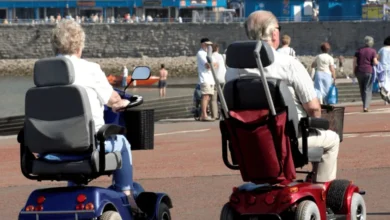Nutrition and Lifestyle Advice for a Successful Knee Replacement Surgery

Maximise knee replacement success with top nutrition and lifestyle tips. Enhance healing, lower Ireland’s surgery costs, and recover fast.
Undergoing knee replacement surgery can help you regain your independence and restore your quality of life. However, the surgery remains a major intervention, and recovery can take some time. The recovery process is primarily influenced by your underlying health, either helped or hindered by your diet and lifestyle.
Optimising your nutrition, lifestyle, and exercise can ensure you get stronger and more mobile faster. That means more time spent with your grandkids, going on walks, playing golf, or just being independent.
Below, we’ve compiled expert nutritional and lifestyle advice proven to reduce the risk of complications and boost your chances of a successful (uneventful) recovery.
In this guide, you’ll find:
- Hip Replacement Recovery Explained
- Nutrition Guidelines for Faster Healing
- Lifestyle Tips for a Better Recovery
Hip Replacement Recovery Explained
Whether you underwent knee replacement surgery abroad or at home, you’ll need to allocate several weeks for recovery. Immediately after the surgery, a physical therapist will begin introducing basic exercises to strengthen the muscle and get you mobilised. However, most patients spend between 1 to 3 days in hospital to recover.
After you return home, you can expect to continue to rely on crutches or walking sticks for around 3 to 6 weeks. Around this time, you should be able to perform activities of daily living, such as driving or walking upstairs. Most people return to work (if not retired) about 6 to 12 weeks after the operation. Although a complete recovery can take up to three months, allowing you to engage in some low-impact sports.
Even after the recovery period, specific movements are off-limits. Your surgeon will advise on sports and activities to avoid for the best protection of the implant.
Nutrition Guidelines for Faster Healing
You are what you eat. In the postoperative period, your recovery depends on your diet. By fuelling your body with the right nutrients, you can enhance wound healing, rebuild muscle and tissue, and reduce the risk of infection.
Usually, medical professionals will advise a balanced diet. But what does that include? We advise a diet rich in fruits and vegetables to gain all your micronutrients. Your average plate should be split into half, consisting of non-starchy vegetables, a quarter of some carbohydrates (think rice, potatoes, pasta, etc.), and the remaining quarter containing protein. Add an after-dinner piece of fruit to finish.
However, there are some specific nutrients you want to target due to their role in the healing and recovery process. These include:
Protein-Rich Foods
Protein is the building block of muscle and tissue. It’s what everything from your immune system to your red blood cells are made of. Ensure you include a healthy portion of lean meats, poultry, fish, beans, tofu, and legumes in your diet to support muscle recovery and wound healing.
Without the right protein content – and most people don’t eat enough protein – you won’t build enough muscle to regain your strength, slowing the recovery timeline.
Vitamins and Minerals
Vitamins and minerals support vital functions within the body. Often, they’re the key factor that enables immune function, bone regrowth, muscle development, wound healing, and much more.
What specific vitamins and minerals should you prioritise? Vitamin D and calcium work together to build stronger bones, improving the implant’s longevity and reducing the risk of fractures. Eat foods like dairy products, fortified foods, and leafy greens.
On the other hand, Vitamin C helps collagen formation (a critical building block of connective tissue) and wound healing. You’ll find Vitamin C in citrus fruits, berries, and bell peppers.
Whole Grains
Choose whole grains like brown rice, quinoa, and whole wheat bread over refined grains. These staple foods provide your body with a stable source of energy throughout the day and also include several micronutrients.
Foods to Avoid
When recovering from knee replacement surgery, certain foods can hinder your healing process or exacerbate inflammation. Here’s a quick overview of the foods to avoid or reduce:
- Sugary Foods and Drinks: Candies, pastries, sodas, and other sugary items can increase inflammation and slow down the healing process.
- Processed and Red Meats: Foods like bacon, sausages, and processed deli meats can contribute to increased inflammation and should be consumed minimally.
- Refined Carbohydrates: White bread, white rice, and other refined grains can have a pro-inflammatory effect and offer less nutritional value compared to whole grains.
- Trans Fats and High-Fat Snacks: Avoid trans fats found in some margarines, fried foods, and packaged snacks, as they can promote inflammation.
- Alcohol: Excessive alcohol consumption can impede your recovery by affecting your immune system and bone healing.
Lifestyle Tips for a Better Recovery
Exercise is foundational to a stronger, faster recovery. Your physical therapist will introduce several exercises to help strengthen your muscles and improve mobility. These exercises will become progressively more difficult as your recovery advances.
However, exercise alone doesn’t guarantee a perfect recovery. You should also follow these lifestyle tips:
- Emphasise Sleep: Proper sleep is essential for knee replacement recovery. During sleep, your body repairs itself, so aim for 7-9 hours of good sleep nightly. Establishing a regular sleep routine can further support your recovery.
- Reduce Stress: The recovery journey includes mental well-being. Stress can hinder the healing process, so it’s important to find ways to relax. Techniques like deep breathing, meditation, or gentle yoga can help manage stress, allowing your body to focus on healing.
- Quit Smoking: Smoking hampers recovery by reducing blood flow to the healing knee. If you’re a smoker, quitting is a vital step to ensure your recovery is as efficient and effective as possible.
Choose Kardiolita Hospital For Your Knee Replacement Surgery
Our seasoned surgical team, with over two decades of experience, specialises in successful knee replacements at a fraction of the cost in Ireland. Lithuania’s global reputation for low complication rates in orthopaedic surgeries ensures you receive top-tier care.
Our comprehensive recovery program is designed to minimise complications and optimise your recovery. Contact us to discover more about our knee replacement services and how we can support you through your surgery and recovery journey.






